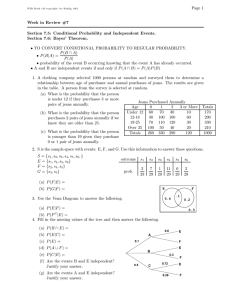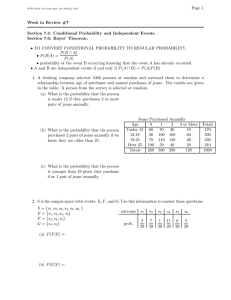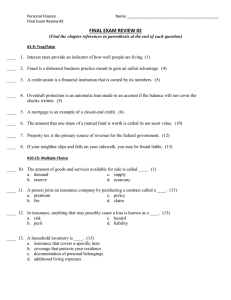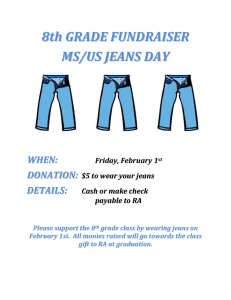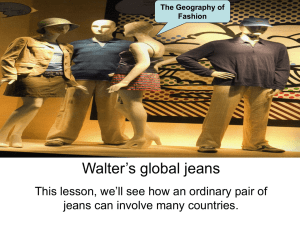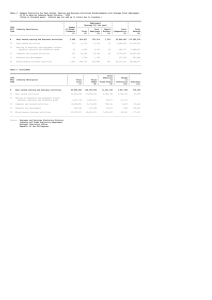Page 1 Week in Review–Additional Chapter 1 Material
advertisement
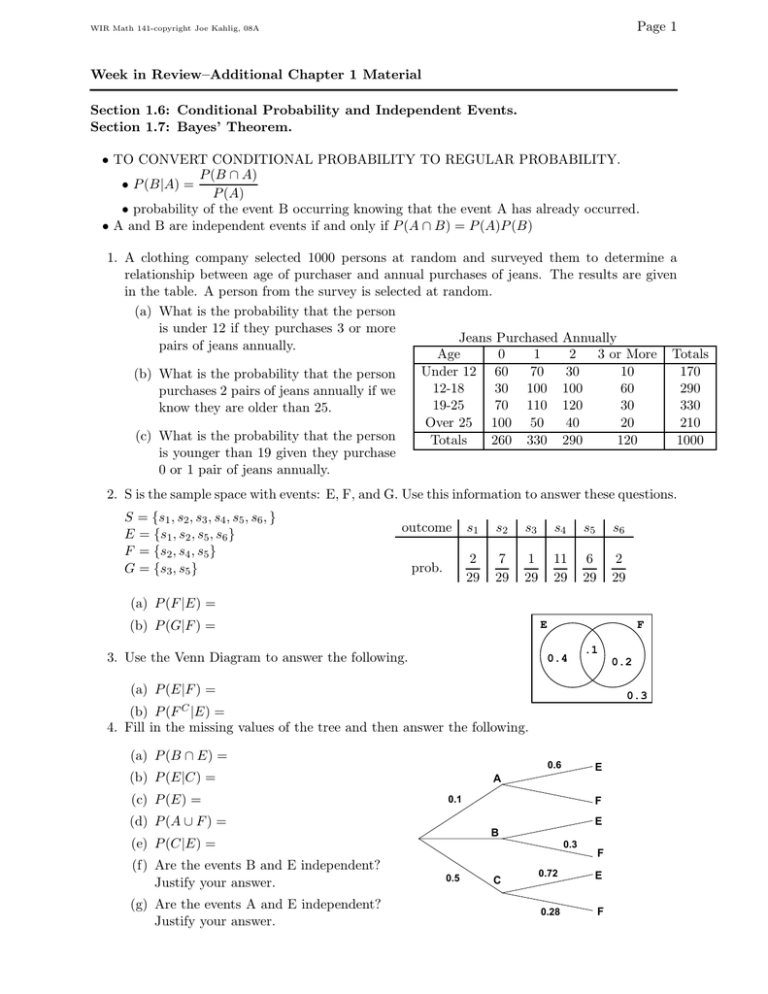
Page 1
WIR Math 141-copyright Joe Kahlig, 08A
Week in Review–Additional Chapter 1 Material
Section 1.6: Conditional Probability and Independent Events.
Section 1.7: Bayes’ Theorem.
• TO CONVERT CONDITIONAL PROBABILITY TO REGULAR PROBABILITY.
P (B ∩ A)
• P (B|A) =
P (A)
• probability of the event B occurring knowing that the event A has already occurred.
• A and B are independent events if and only if P (A ∩ B) = P (A)P (B)
1. A clothing company selected 1000 persons at random and surveyed them to determine a
relationship between age of purchaser and annual purchases of jeans. The results are given
in the table. A person from the survey is selected at random.
(a) What is the probability that the person
is under 12 if they purchases 3 or more
Jeans Purchased Annually
pairs of jeans annually.
Age
0
1
2
3 or More Totals
Under
12
60
70
30
10
170
(b) What is the probability that the person
12-18
30 100 100
60
290
purchases 2 pairs of jeans annually if we
19-25
70
110
120
30
330
know they are older than 25.
Over 25 100 50
40
20
210
(c) What is the probability that the person
Totals
260 330 290
120
1000
is younger than 19 given they purchase
0 or 1 pair of jeans annually.
2. S is the sample space with events: E, F, and G. Use this information to answer these questions.
S = {s1 , s2 , s3 , s4 , s5 , s6 , }
E = {s1 , s2 , s5 , s6 }
F = {s2 , s4 , s5 }
G = {s3 , s5 }
outcome
s1
s2
s3
s4
s5
s6
prob.
2
29
7
29
1
29
11
29
6
29
2
29
(a) P (F |E) =
(b) P (G|F ) =
E
3. Use the Venn Diagram to answer the following.
F
0.4
.1
0.2
(a) P (E|F ) =
0.3
(b) P (F C |E) =
4. Fill in the missing values of the tree and then answer the following.
(a) P (B ∩ E) =
0.6
(b) P (E|C) =
(c) P (E) =
0.1
(d) P (A ∪ F ) =
(g) Are the events A and E independent?
Justify your answer.
F
E
B
(e) P (C|E) =
(f) Are the events B and E independent?
Justify your answer.
E
A
0.3
0.5
C
F
0.72
E
0.28
F
Page 2
WIR Math 141-copyright Joe Kahlig, 08A
5. Two cards are drawn from a standard deck of cards without replacement. What is the
probability that the first card is a club if the second card is a club?
6. Two cards are drawn from a standard deck of cards without replacement. What is the
probability that the first card is an Ace if the second card is a diamond?
7. A building on campus has three vending machines: two coke machines and a snack machine.
Based on the model of the machines, the first coke machine has a 12% chance of breaking
down in a particular week and the second coke machine has a 4% chance of breaking down
in a particular week. The snack machine has a 10% chance of breaking down in a particular
week. Assuming independence, find the probability that exactly one machine breaks down.
8. The following information was compiled regarding married couples living in single-family
dwellings. It was found that in 30% of these households, both the husband and the wife
worked, and that 10% of these couples were renting. In 50% of the households, only the
husband worked, and 20% of these couples were renting. In 15% of the households, only the
wife worked, and 70% of these couples were renting. In the households where neither worked,
95% were renting. A couple from this group is selected at random.
(a) Find the probability that this couple is renting.
(b) What is the probability that only the husband works and the couple owns their house?
(c) If the couple is renting, find the probability that only the wife is working.
9. An auto insurance company classifies its drivers as good risk, medium risk or bad risks. The
table shows the percent of the drivers in these classifications and the probability that a driver
in that classification will have an accident during the next year. A driver is selected bar
random.
(a) What is the probability that the driver will have
an accident in the next year?
(b) What is the probability that the driver is rated
as a medium risk if they had an accident in the
next year?
(c) What is the probability that the driver is rated
as a bad risk and they did not have an accident
in the next year.
Classification
good
medium
bad
drivers(%)
50
35
15
Accident(%)
2
5
12
